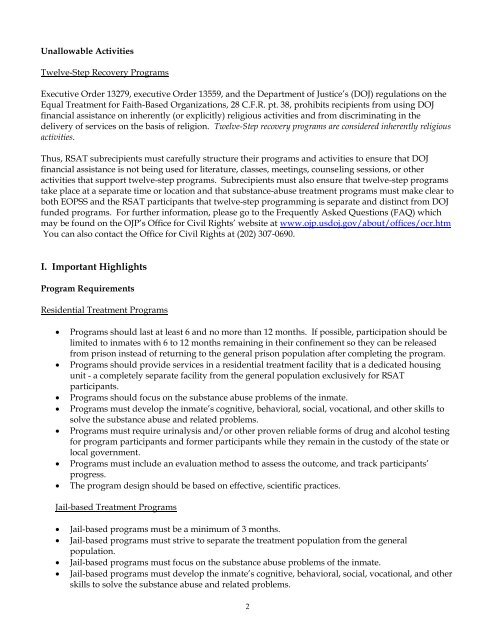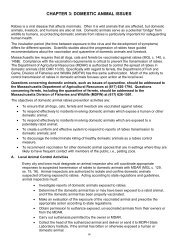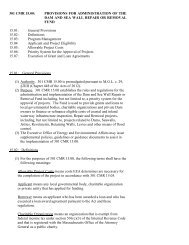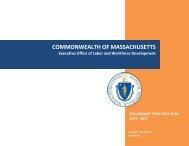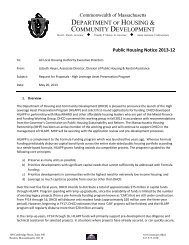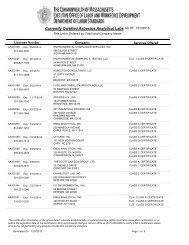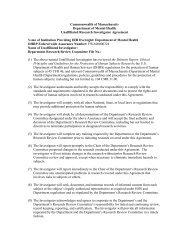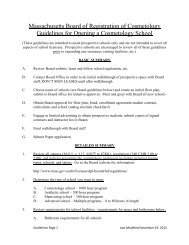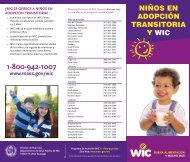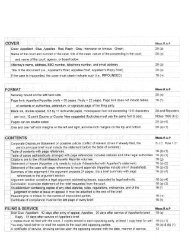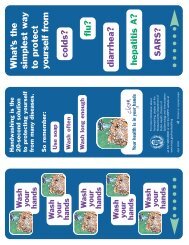Edward Byrne Memorial State and Local Law ... - Mass.Gov
Edward Byrne Memorial State and Local Law ... - Mass.Gov
Edward Byrne Memorial State and Local Law ... - Mass.Gov
Create successful ePaper yourself
Turn your PDF publications into a flip-book with our unique Google optimized e-Paper software.
Unallowable Activities<br />
Twelve-Step Recovery Programs<br />
Executive Order 13279, executive Order 13559, <strong>and</strong> the Department of Justice’s (DOJ) regulations on the<br />
Equal Treatment for Faith-Based Organizations, 28 C.F.R. pt. 38, prohibits recipients from using DOJ<br />
financial assistance on inherently (or explicitly) religious activities <strong>and</strong> from discriminating in the<br />
delivery of services on the basis of religion. Twelve-Step recovery programs are considered inherently religious<br />
activities.<br />
Thus, RSAT subrecipients must carefully structure their programs <strong>and</strong> activities to ensure that DOJ<br />
financial assistance is not being used for literature, classes, meetings, counseling sessions, or other<br />
activities that support twelve-step programs. Subrecipients must also ensure that twelve-step programs<br />
take place at a separate time or location <strong>and</strong> that substance-abuse treatment programs must make clear to<br />
both EOPSS <strong>and</strong> the RSAT participants that twelve-step programming is separate <strong>and</strong> distinct from DOJ<br />
funded programs. For further information, please go to the Frequently Asked Questions (FAQ) which<br />
may be found on the OJP’s Office for Civil Rights’ website at www.ojp.usdoj.gov/about/offices/ocr.htm<br />
You can also contact the Office for Civil Rights at (202) 307-0690.<br />
I. Important Highlights<br />
Program Requirements<br />
Residential Treatment Programs<br />
<br />
<br />
<br />
<br />
<br />
<br />
<br />
Programs should last at least 6 <strong>and</strong> no more than 12 months. If possible, participation should be<br />
limited to inmates with 6 to 12 months remaining in their confinement so they can be released<br />
from prison instead of returning to the general prison population after completing the program.<br />
Programs should provide services in a residential treatment facility that is a dedicated housing<br />
unit - a completely separate facility from the general population exclusively for RSAT<br />
participants.<br />
Programs should focus on the substance abuse problems of the inmate.<br />
Programs must develop the inmate’s cognitive, behavioral, social, vocational, <strong>and</strong> other skills to<br />
solve the substance abuse <strong>and</strong> related problems.<br />
Programs must require urinalysis <strong>and</strong>/or other proven reliable forms of drug <strong>and</strong> alcohol testing<br />
for program participants <strong>and</strong> former participants while they remain in the custody of the state or<br />
local government.<br />
Programs must include an evaluation method to assess the outcome, <strong>and</strong> track participants’<br />
progress.<br />
The program design should be based on effective, scientific practices.<br />
Jail-based Treatment Programs<br />
<br />
<br />
<br />
<br />
Jail-based programs must be a minimum of 3 months.<br />
Jail-based programs must strive to separate the treatment population from the general<br />
population.<br />
Jail-based programs must focus on the substance abuse problems of the inmate.<br />
Jail-based programs must develop the inmate’s cognitive, behavioral, social, vocational, <strong>and</strong> other<br />
skills to solve the substance abuse <strong>and</strong> related problems.<br />
2


